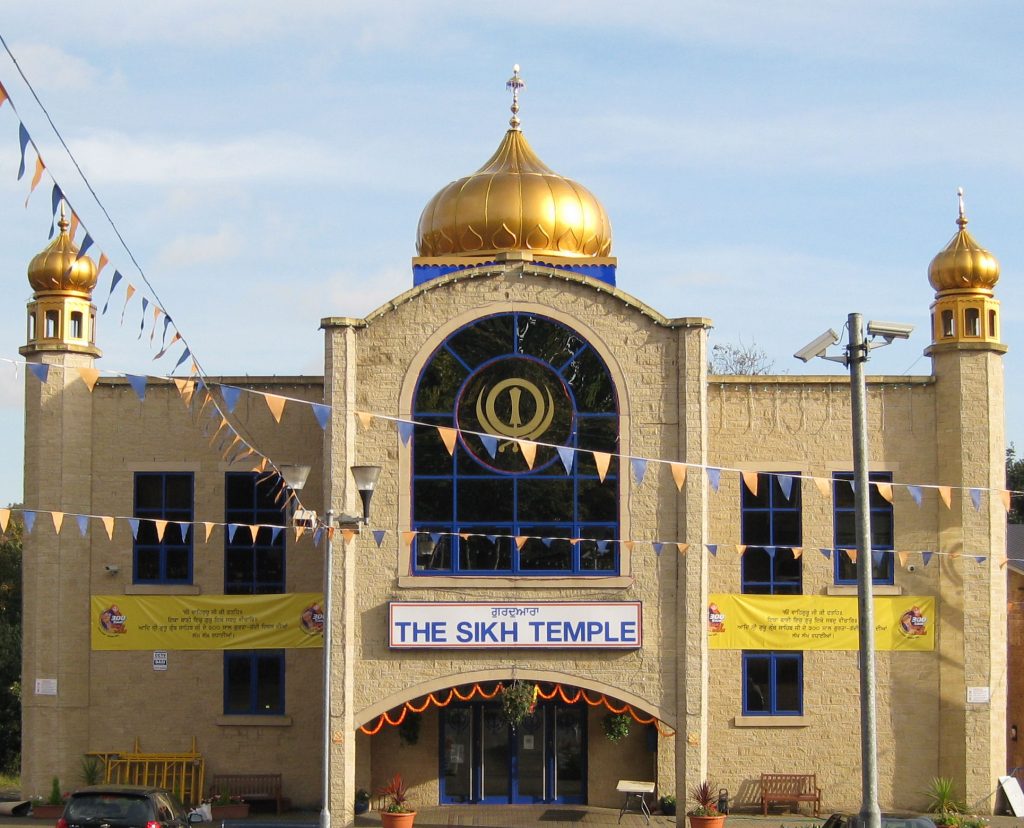Sikh funeral rites: the ceremony

Sikh funeral rites: the ceremony A sikh-funeral takes place as soon as possible after the death of a person, funeral directors ideally, this would be within three days or less of the passing of the deceased. In most cases, this is possible if they have not died in suspicious circumstances and a post mortem is not needed.
Before the funeral ceremony, at the funeral director the body of the deceased is washed in a yoghurt bath while prayers are recited, and then dressed in clean clothes including the appropriate headwear for their gender, this would be a headscarf cover their heads for a woman and a turban for a man. If the deceased was a baptised Sikh, then they are also dressed in their karkars, these are the five articles of the Sikh faith. They include: ⦁ Kesh – the uncut hair traditional with the Sikh faith ⦁ Kangha – a wooden comb ⦁ Kaccha/Kachhehra – an undergarment ⦁ Karha- an iron bracelet Kirpan- a dagger The family of the deceased and friends then surround the body of the deceased with flowers typically orange and white chrysanthemums, as these are the mourning blooms of India and throughout much of Asia. It may be an open or closed casket. It is an element that is under family control. A funeral ceremony in Sikhism is known as ‘Antum Sanskaar’ which basically means a celebration of a complete life. The Sikhs believe death as part of the natural process of the soul’s reincarnation, the soul itself is not subject to death and they, therefore, believe that after death the spirit becomes one with the divine. Death is a mere journey from God, through the created universe, and back then to God. Thus the soul never dies, and because of this, there is no formal mourning period after death in the Sikhism religion. At the funeral, the loved ones of the departed will be quiet and subdued. This to show their resignation to the will of God in taking the soul of their loved one, and therefore the family of the deceased and guests should follow them in their example. It is a tradition in the Sikh faith to mourn quietly and privately; with demonstrative mourning displays such as unconcealed weeping or wailing, are frowned upon. Followers of the Sihkism faith do not believe in rituals that they perceive to be superstitious and, therefore, their funerals are quite simple affairs. In general, it is a gathering of the whole community at the gurdwara to recite prayers about their acceptance that the deceased has gone and their dedication to God. They may often repeat the word ‘Waheguru’ which means wonderful Lord. If you are not of the Sikhism faith then you don’t need to join in with the prayers and chanting, you should take your cue to sit or stand away from the rest of the funeral congregation and stay quiet during the prayers or reading of the Sikh scriptures. This will show both respects for the deceased and their relatives and for the Sikhism faith itself. Sikhs due permit the reading of eulogies at their funerals, however, if read they are kept short, so they do not detract anything away from the religious aspects and contents of the ceremony. Excessively long or sentimental eulogies may cause distress to the loved ones and make them break their spiritual detachment, or it may offend the belief in the Sikhism faith that the body is no more than a vessel for the soul, in which case at the funeral they are nothing but a shell. To start the funeral service, there is an ‘ardas’ said that is a community prayer. The minister may say a few words and offer a few prayers, but this is optional and depends on whether the minister feels it would be appropriate. Then the two daily prayers from the Sikhism faith the Japji and the Kirtan Sohila are both recited, after which the cremation can officially begin. The recitation of these states that the funeral is in effect over, but these prayers can be said throughout the cremation. The guests can leave the service, and this usually lasts for between 30 to 60 minutes the funeral directors can help with this. After this, a service can be held at the gurdwara, but this is optional and depends on whether the family desire it. ‘Akal’ is chanted throughout this service. The meaning of this word is undying and is chanted constantly to assist in releasing the soul to return to the infinite with God. This second service can last for up to an hour. Sikh cremation The Sikhism faith prefers cremation grounds, and as a rule, however, burial is acceptable on the provision that no headstone or monument is placed down to commemorate the dead. This lack of a monument symbolises their belief that the soul of the deceased has already passed on and into another body and reflects the teachings of their scripture, that remains of the deceased are nothing but empty shells now that the soul’s reincarnation has taken place. After the funeral has ended, only a select group of the family of the deceased and extremely close friends can escort the coffin to the crematorium. This is because just their loved ones can witness the cremation process and offer any prayers while it occurs. Traditionally this would have taken place out in the open on a funeral pyre. However, throughout the United Kingdom, and much of the western world, this is illegal. Therefore the oldest family member will press the button to commence the cremation, and all the family will watch until the process is over. As is the tradition for many Asian regions that believe in reincarnation, following cremation Sikhs scatter the ashes of their dearly departed in running water or in the sea. There are no specific holy rivers in the Sikhism religion, and therefore the deceased’s loved ones can scatter the ashes on any body of water legally permitted by the country that they reside in. Most often than not they choose a location for sentimental reasons for scattering ashes. On the first anniversary of the deceased’s death, the family members usually gather together to pray and eat a meal together. They may choose to do this at the Gurdwara, and if this is the case, then the meal will be shared between the entire congregation. As with after the funeral this is not an occasion of mourning but is rather an excuse to celebrate the loved one that departed and the happy times that they spent together. It also centres on praising God for allowing the deceased to be reincarnated into their new form. Sikh funeral rites: after cremation It is not expected to visit the homes of the bereaved after the ceremony, but it is optional if desired. There are often memorial services held at the family home, and this is done especially if the funeral has happened in another country. Sometimes the family sponsors an unbroken reading by the Siri Guru Granth Sahib, this is the entire holy scripture, in a ceremony known as ‘Arkhand Patth. This can take place at family home, at the Gurdwara or another location. This is ideally conducted in a single setting which in the native Gurmukhi language, this reading can take up to 48 hours or in 72 hours if read in English. The text is sometimes shared between people with them taking it in turns to read. However, the reading can be done in increments over the course of a more extended period, although this usually lasts no longer than ten days, if that is more convenient for the loved ones. In the case of the funeral being delayed the family can also choose to begin the Akhand Paath before the ceremony, and in this case the completion ceremony of this reading known as ‘Bhog Paona’, will generally coincide with the day of the departed loved one’s funeral. It is possible for food to be served at the time of the reading however due to the nature of the Sikhism religion there will be no alcoholic beverages offered, and none should be taken. The mourners go back to a normal routine after a few days to a week at most after the funeral. People visiting should not speak of loss or sadness but should centre on good memories of joy and happiness of the soul returning to its rightful and true home with God. There are no rituals involved at this time. Sikh funeral dress code In terms of a Sikhism funeral, it is best to wear subdued neutral colours, White, which is the Asian colour of mourning, is the most suitable colour but charcoal grey, black and navy are also all acceptable, especially if the funeral is taking place in a western country. Bright colours such as oranges, greens and yellows, but especially red as this is the colour of joy throughout most of Asia, and any patterned designs should be avoided as they are seen as disrespectful to the dead and the faith. Smart dress in formal dresses or suits would be most appropriate. It should be modest, and it should avoid showing too much skin as again this is very disrespectful. Ostentatious jewellery should also be avoided. Sikhs of both genders cover their hair at any religious ceremonies. If you are attending a Sikh funeral taking place at home, ask the family members what the most appropriate head attire would be, they may be fine with you leaving it uncovered, if the ceremony is taking place at a place in worship I the Gurdwara, head coverings may be provided, however, you must be prepared to bring something to cover your head and check if you are unsure. Whether the ceremony is held at a Gurdwara or at the home of a relative, you will usually be asked to remove your shoes to show respect to the dead and the religious faith, Funeral prayer will typically take place seated on the floor, therefore wear shoes that can be slipped on and off easily and quickly and make sure that your socks are clean, have no holes and are of neutral colours. With our support, you’re assured of our commitment to helping you through this difficult time. It doesn’t matter what time of day, or what day of the week you need support, we’re here for you. No matter how you feel at this moment, you have our commitment – you’re never alone. We want you to know that we appreciate your attention to detail. Samantha is charge of all procedure – from bringing your loved one into our care to supporting and guiding you on the day. We’re here for our customers whenever they need us, 24 hours a day, 365 days a year. Samantha will walk you through how to plan a funeral, and ensure that you receive the guidance you need. You may choose to call us now at 0116 2788868. Bay Tree Funerals 7A Welford Rd, Blaby, Leicester LE8 4FT Get directions 0116 2788868 24 hours info@box5800.temp.domainsSikh funerals Leicester2018-11-182022-09-08https://baytreefunerals.co.uk/wp-content/uploads/2018/01/baytreelogo.pngBay Tree Funeralshttps://baytreefunerals.co.uk/wp-content/uploads/2018/11/sikhtemple.jpg200px200px
